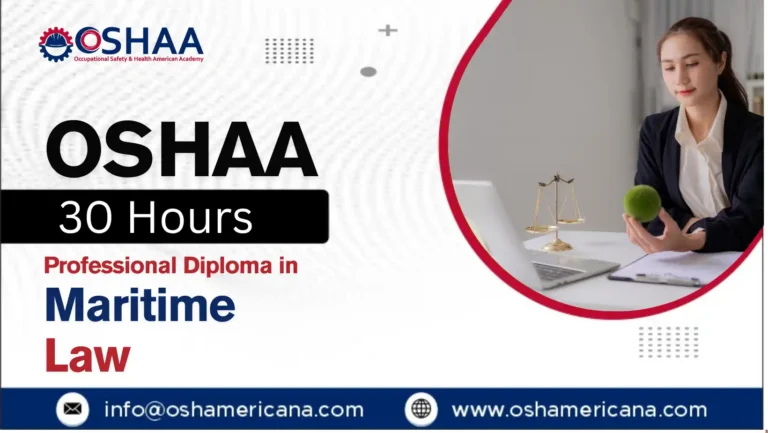In the world of sports, injuries are inevitable. Whether it’s a minor sprain or a more serious medical emergency, having the right knowledge and skills to provide immediate first aid can make a significant difference in an athlete’s recovery. The OSHAA 30-Hours Professional Diploma in First Aid for Sports is designed to equip individuals with essential first aid skills tailored specifically for sports-related injuries.
Sports first aid is a specialised area of medical care that focuses on the immediate treatment and management of injuries sustained during physical activity. Whether in amateur or professional sports, proper first aid can prevent minor injuries from becoming serious and ensure that athletes receive the necessary care before professional medical assistance arrives.
The OSHAA 30-Hours Professional Diploma in First Aid for Sports is a valuable qualification for anyone involved in sports, fitness, and athletic performance. By equipping yourself with specialised first aid skills, you can ensure athlete safety, respond effectively to emergencies, and contribute to a healthier and more secure sporting environment.
Whether you are a coach, athlete, healthcare professional, or sports enthusiast, this course provides the essential knowledge and skills needed to handle sports-related injuries with confidence and professionalism.
OSHAA 30-Hours Professional Diploma in First Aid for Sports
Study Units
Learning Outcomes
Introduction to Sports First Aid (2 Hours)
- Understand the fundamental principles of first aid in a sports setting.
- Recognise the importance of quick and effective first aid response during sports activities.
- Identify the responsibilities of a sports first aider.
- Learn how to create a safe sports environment to minimise injuries.
Assessing and Managing Sports Injuries (4 Hours)
- Learn how to conduct primary and secondary assessments of injured athletes.
- Understand the signs and symptoms of common sports injuries.
- Develop skills to manage injuries until professional medical help arrives.
- Recognise when an injury requires emergency medical attention.
Soft Tissue Injuries: Sprains, Strains, and Bruises (3 Hours)
- Identify different types of soft tissue injuries and their causes.
- Learn the RICE (Rest, Ice, Compression, Elevation) method for effective injury management.
- Understand how to prevent and reduce swelling, pain, and further complications.
- Gain skills in basic taping and support techniques for soft tissue injuries.
Fractures, Dislocations, and Joint Injuries (4 Hours)
- Recognise the signs and symptoms of fractures, dislocations, and joint injuries.
- Understand the correct first aid procedures for immobilisation and support.
- Learn how to provide immediate care to prevent further damage.
- Identify the importance of seeking professional medical treatment for serious injuries.
Concussions and Head Injuries in Sports (5 Hours)
- Understand the causes and effects of concussions and head trauma.
- Recognise the symptoms of mild to severe head injuries.
- Learn the correct response protocol for suspected concussions.
- Develop awareness of return-to-play guidelines for athletes recovering from head injuries.
Cardiac Emergencies, CPR, and AED Use (4 Hours)
- Recognise the symptoms of cardiac arrest and heart-related conditions in athletes.
- Learn the step-by-step process for performing CPR on adults and children.
- Understand the proper use of an Automated External Defibrillator (AED).
- Develop confidence in responding to life-threatening cardiac emergencies.
Bleeding, Wound Care, and Shock Management (5 Hours)
- Learn how to control bleeding effectively using direct pressure and dressing techniques.
- Understand the different types of wounds and their appropriate treatment.
- Recognise the signs and symptoms of shock and how to provide first aid.
- Gain knowledge on infection prevention and proper wound care procedures.
Heat-Related Illnesses and Hydration Management (3 Hours)
- Identify the symptoms of heat exhaustion, heatstroke, and dehydration.
- Learn the importance of proper hydration in sports performance and injury prevention.
- Develop skills to provide first aid for heat-related conditions.
- Understand prevention strategies for athletes training in hot and humid environments.
- Enhanced Safety in Sports – Gain essential skills to prevent and manage sports-related injuries effectively.
- Life-Saving Knowledge – Learn how to handle medical emergencies such as cardiac arrest, concussions, and fractures.
- Improved Injury Management – Understand proper techniques to assess, treat, and rehabilitate sports injuries.
- Recognised Qualification – Boost career prospects in coaching, fitness training, sports therapy, and healthcare.
- Confidence in Emergency Response – Develop the ability to act quickly and efficiently in high-pressure situations.
- Better Athlete Well-being – Help athletes recover faster and return to play safely.
- Hands-on Practical Skills – Learn real-world first aid techniques tailored specifically for sports environments.
- Legal and Ethical Awareness – Understand the responsibilities of a first aider in sports settings.
- Career Advancement Opportunities – Enhance employability in sports coaching, physiotherapy, gym instruction, and healthcare roles.
- Contribution to a Safer Sports Community – Play a key role in promoting health, safety, and injury prevention in athletic activities.
The OSHAA 30-Hour Professional Diploma in First Aid for Sports is ideal for individuals involved in sports, fitness, and healthcare who want to gain essential first aid skills to ensure athlete safety. This course is suitable for:
- Sports Coaches and Trainers – To provide immediate care and injury management during training and competitions.
- Physical Education Teachers – To ensure the safety of students during school sports activities.
- Athletes and Fitness Enthusiasts – To understand self-care and assist teammates in case of injuries.
- Physiotherapists and Sports Therapists – To enhance injury prevention and rehabilitation techniques.
- Healthcare Professionals – To specialise in sports-related emergency care and first aid response.
- Parents of Young Athletes – To be prepared for injuries during training or matches.
- Sports Officials and Event Organisers – To manage player safety during competitions and tournaments.
- Gym Instructors and Personal Trainers – To respond to fitness-related injuries and emergencies in gym environments.
This course provides the necessary knowledge and skills to handle sports-related emergencies, making it an essential qualification for anyone involved in sports and fitness.







